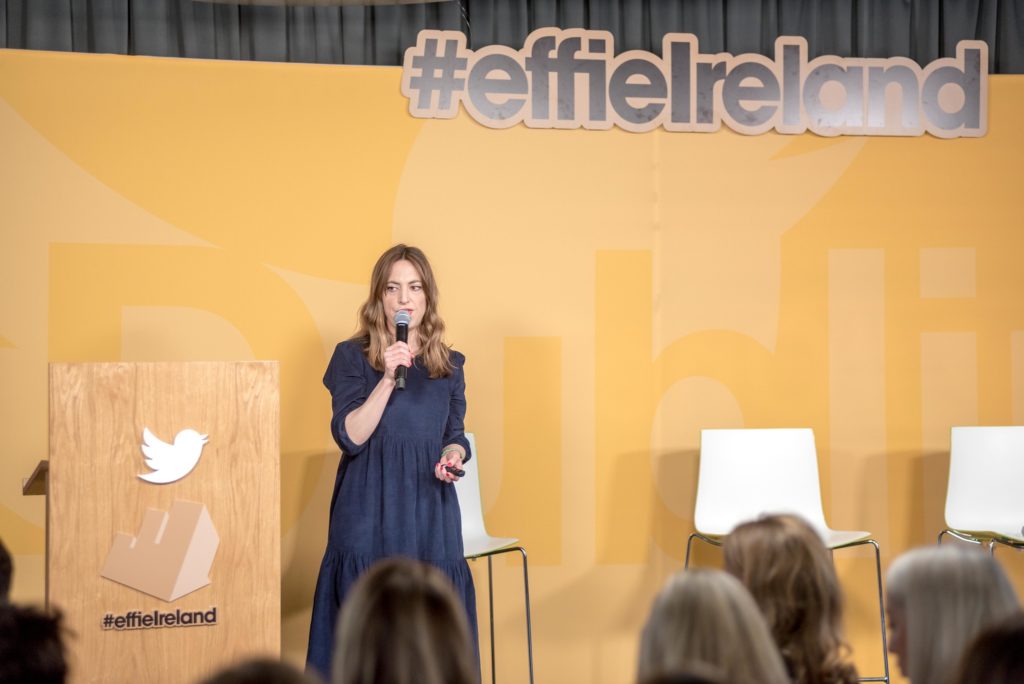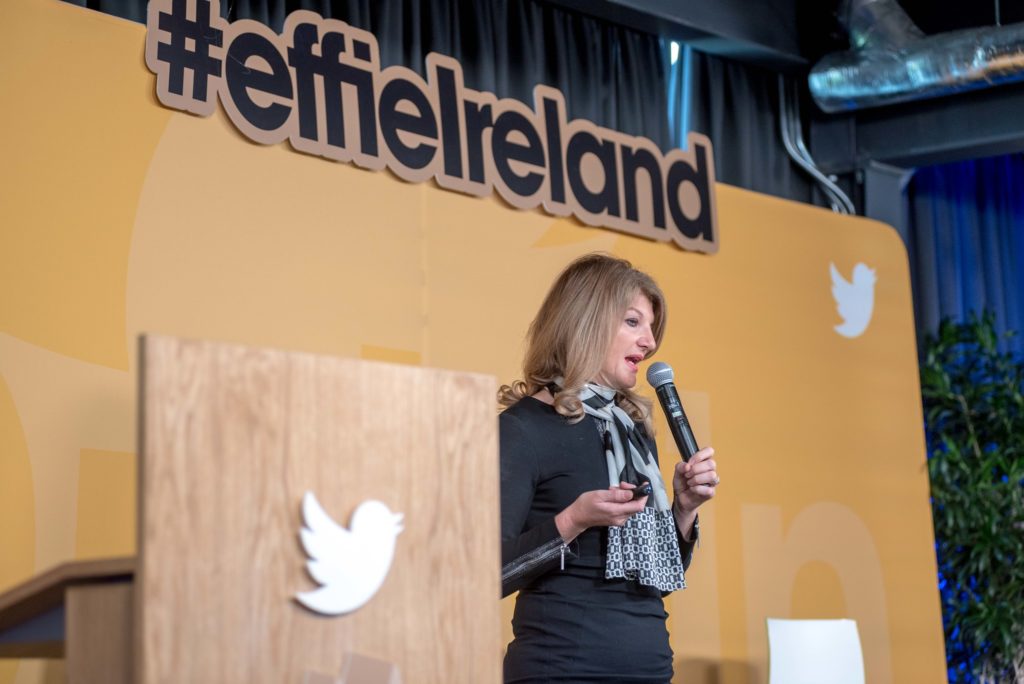How to Win an Effie 2020
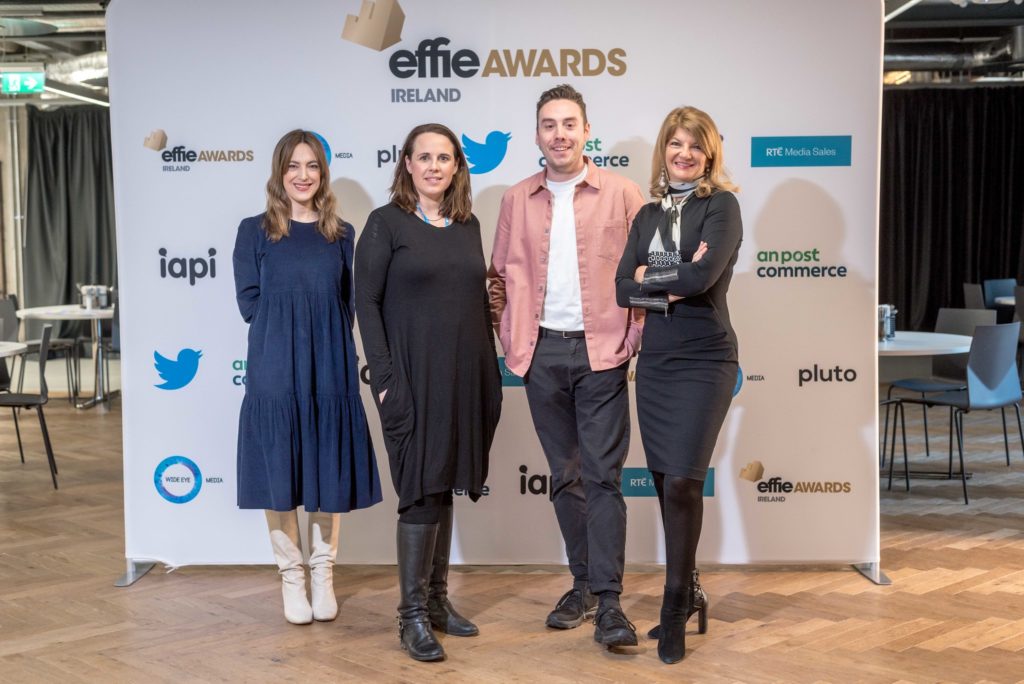
The How to Win an Effie event took place on February 26th in Twitter HQ. Speakers included previous Effie winners Rose Van Orden of McCann London and James MacAskill of MullenLowe; the event was emceed by Charlie Stoney, CEO of IAPI. The attendees learned the value of great insight and creative, and how to craft winning award entries.
Rose Van Orden, Planning Partner, McCann London
Rose won and Effie Award for her work with L’Oréal. However, that was not the work she wanted to talk about at this event. She instead spoke about her work for Aldi on the creation of Kevin the Carrot, a campaign and character that most of the room recognized as the Irish version of the campaign had a huge share of voice during its run.
She opined that we needed a better word for effectiveness, as it has been thrown around almost to the point of meaninglessness. She suggested, quite simply, Work that Works. We, as industry professionals, put time and effort into strategy, if we don’t measure what works we might as well not bother.
She claimed that there is no excuse now. Back in the day there wasn’t theory on effectiveness, now they are plentiful. She mentioned the work of Byron Sharp, Les Binet and Peter Field, and the more recent work done by System1 and Orlando Wood.
Clients are also more focused on effectiveness. Three quarters have invested more in understanding which marketing levers drive desired outcomes. One third have developed specialist marketing effectiveness units. (Source: IPA, “Culture First”, Cassidy, 2017)
This is driven by the digital environment. The increase in measurements has led to an increased focused on finding which of these are important. Clients are focused on this, so we (agencies and media owners) need to be their partners on this.
Creativity is the main driver of effectiveness. After market size it has been shown to be the most important factor in driving advertising profitability. In work completed by Data2Decisions the multiplier of a great creative execution was 10x.
The first step in creating an effective advertising campaign is objective setting:
- Commercial Objective: What is the commercial benefit we are trying to generate?
- Marketing Objective: What performance improvement will generate this? (volume/value share)
- Behavioural Objective: What change in consumer behaviour is required? (Penetration/Frequency/Volume)
- Role for Comms: What do we need to make consumers think/feel/do to achieve this?
- Comms Objectives: What are the triggers and barriers to achieving this?
- Comms Tactics: What will we do to utilise/address these?
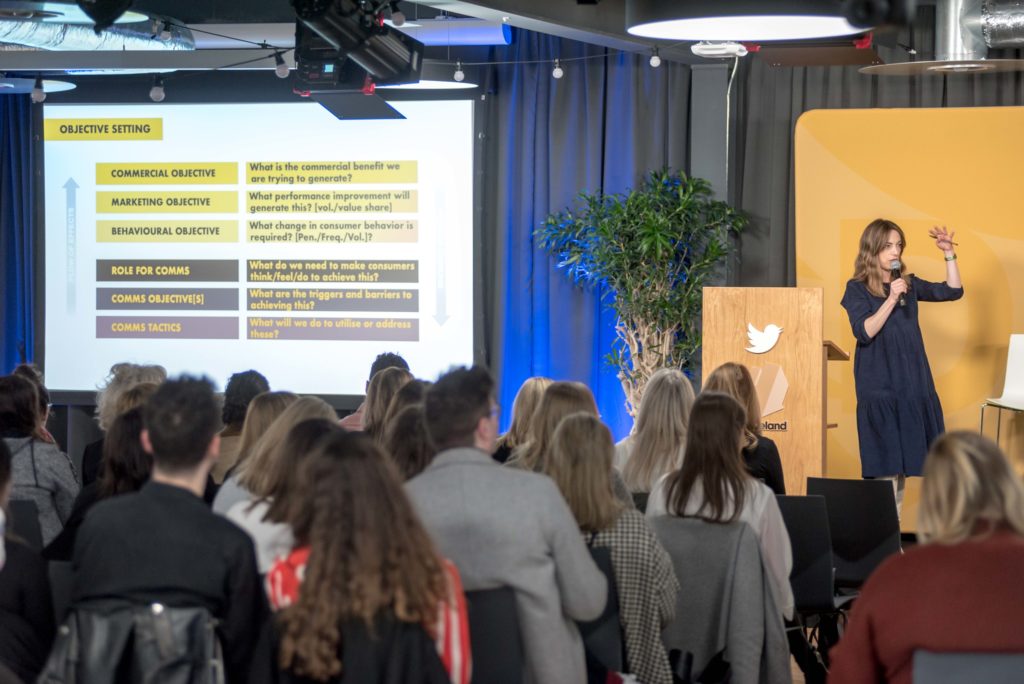
Why effectiveness awards?
It’s important to create effective work but are awards important? Rose argued that they are. If you’ve done good work you need to take credit for it, this can help your career and professional development.It can help your company. It is important to demonstrate the value of your work to current and new clients. And it is important for the industry to recognise the best in class and to show the ROI of great advertising.
She went on to demonstrate how to build your effectiveness case. Firstly, and very unscientifically, you’ll have a feeling everything has worked. For some campaigns, everything is ticking and lines up to deliver the perfect result for the client, these are the campaigns that one should focus on for awards entries. She provided a helpful template of questions one should as when preparing an awards entry.
- Problem: What issue did the campaign need to address?
- Objective: What was the overarching commercial goal?
- Solution: What did you do? What was different to what had been done before?
- Commercial Impact: What were the business results?
- Campaign Impact: How did people respond to the communications? How did this drive their behaviour?
- ROI: What was the incremental value to the campaign?
If you’ve results that line up with objectives you can get to work.
One thing Rose mentioned is that an entry of this quality takes a village. One needs input from the client, research people, those on the account side, editors, and many more.
She implored us to enjoy the craft of storytelling. Writing awards entries can be a fun process and lead to some valuable reflection on work that your proud of. We shouldn’t see this as a daunting task that we have to do, but something we get to do because of the tremendous work we’ve done throughout the year.
She also called on more women to enter. Stats show men are far more likely to write papers and to do it alone. There is a lack of confidence in women in the industry in the value of their own work and this is the opportunity to show that value.
Kevin the Carrott
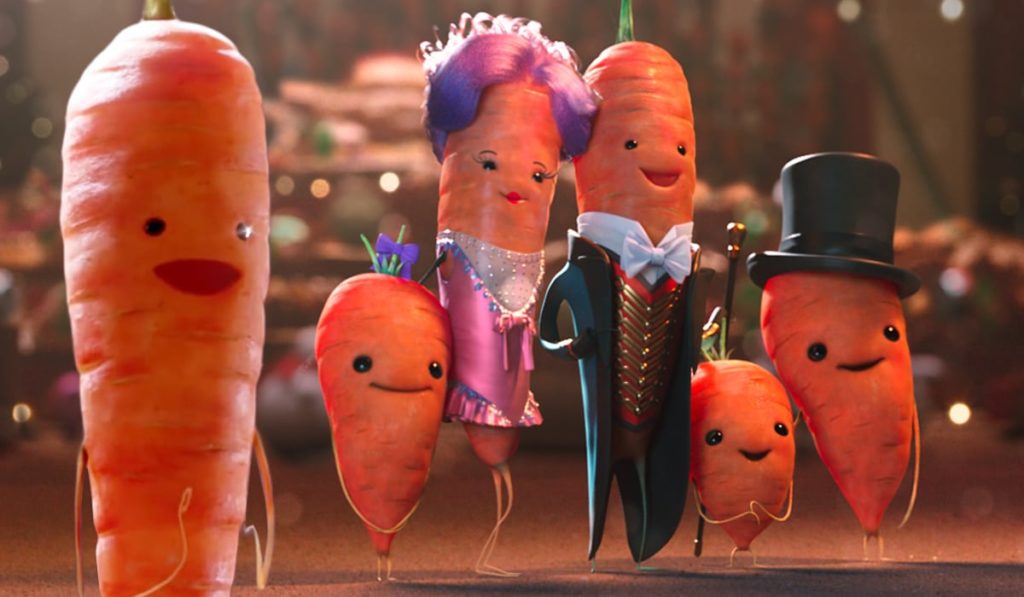
Rose then began to talk about her own work on Aldi, a 2016 Christmas case study.
The challenge was that Aldi was seen as too everyday for Christmas. Aldi is where shoppers do a weekly or top-up shop and Christmas is a special occasion where we like to treat our families and ourselve.
The objective was to increase penetration by 1%. This meant adding 25,000 customers in Ireland and 400,000 in UK.
The comms objective was to communicate that Aldi have what they needed. Even if what they needed were seen as more special because of the time of year.
The insight that McCann found was that the real power of Christmas is in our imagination, we get swept up in it but we know it’s just another day.
The idea they came up with was to ramp up the everyday to ramp up the amazing. They decided to create a brand spokesman around a humble everyday item. And as a result, Kevin the Carrott was born!
The campaign was a huge success, as we all know. Their brand score card showed that they increased their perceived range from 5.3 to 5.43. Their market penetration increased 2.3% YoY in the UK and 1.5% YoY in Ireland. In 2016, Aldi saw the smallest decline in loyalty across all supermarkets in the UK. Commercially, they managed to address Aldi’s Christmas dip in market share and increased sales in premium products to combat ‘trade up and out’.

Show Your Thinking
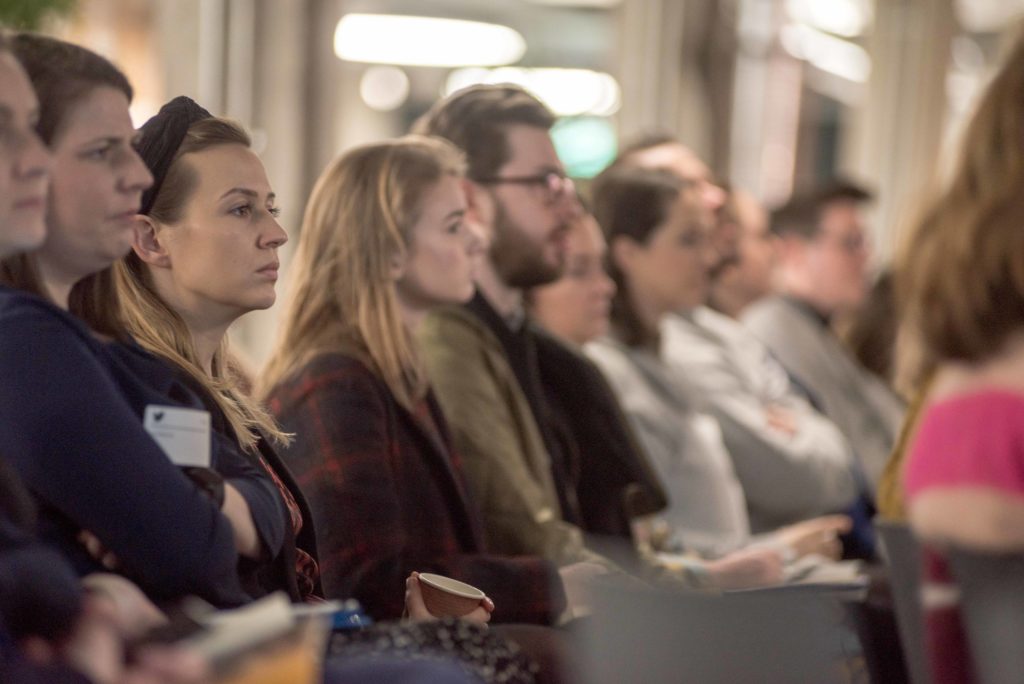
Rose left us with a pattern to show how smart your thinking is when writing awards entries. This shows how much mental judo you had to go through to get to your idea and your results:
- The problem looks like A.
- But actually, it’s B.
- When you understand humans, you’ll realise C.
- Which makes you see that the brand just needed to do D.
- So, we came up with E.
- And look at F.
- Isn’t it great how well it’s working towards A.
James MacAskill, Senior Strategist at MullenLowe
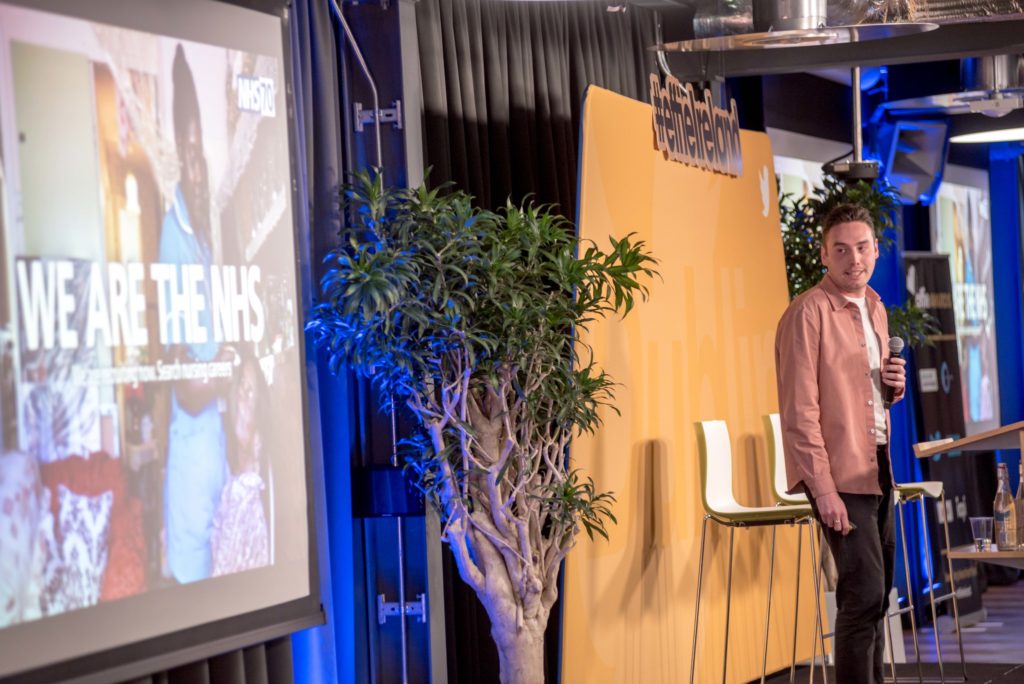
James was the second speaker on the day. He started by stating that it’s media planners’ job to protect the future of the creative industry. It’s getting harder for them to get decent media spends in the first place.
It’s their job to make the case that they should invest in creative to make tech work better. Taking time out to make the case about what you believe is what the Effies, and other awards, are for.
James stated that delivering effectiveness allows them to push creativity further. He gave examples from his own agency such as NHS bridging gender gap, a new film they’re working on and a new physical product for the NHS which he was very excited about but couldn’t reveal yet.
He claimed that winning awards makes for great client relationship. By working through an award entry with a client and seeing it pay off you can enhance the feeling that you’re striving for the same goals. It also allows you to make friends with those geeks in your office who will help you, people who care as passionately about media planning or creative as you do.
He gave two very practical pieces of advice on writing awards entries. Firstly, it’s never too early to start pestering for results, the earlier this is done the more likely you are to get them and get a fuller picture. Secondly, think: how would you explain it to your mum? This will allow you to cut out any jargon or overly complex thinking that will distract from the central story. Try to explain in one to two sentences the Problem, the Strategic Insight and Solution, the Creative Idea and the Results.
’We are the NHS’
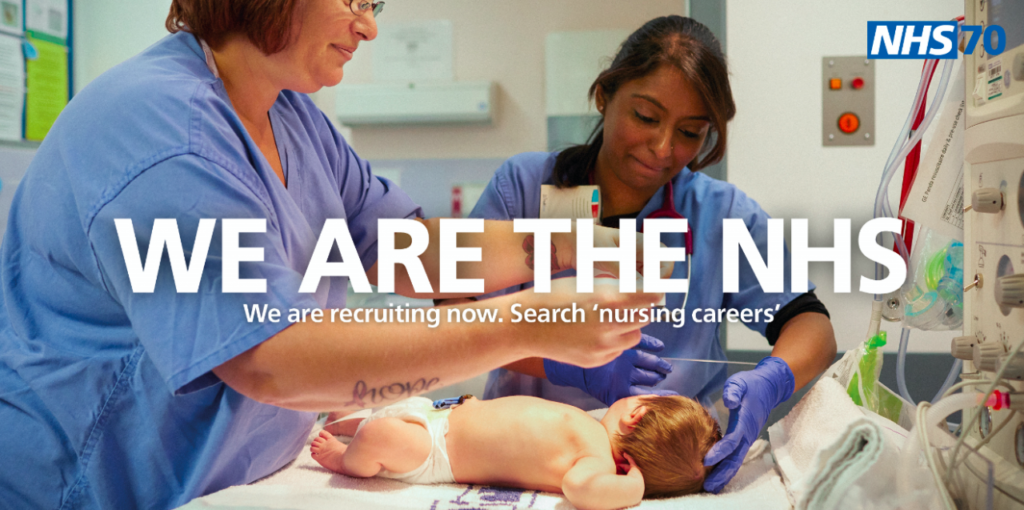
He then went into his own work with the NHS, for which MullenLowe were awarded Silver in the Positive Change: Social Good – Non-Profit Category in the 2019 UK Effies.
The Problem for the NHS was that bursary being cut meant that nursing degree application had been down since 2015, piling pressure on already overburdened front-line staff who were leaving in droves.
The Strategic Insight was that there is an intrinsic link between how the nation feels about the NHS and an individual’s motivation to work in it, so they needed to do a national brand-love campaign.
The Creative Idea was ‘We are the NHS’, a national clarion call to recognise how special the NHS is and people who work in it are.
MullenLowe were briefed to talk to three audiences: teenagers (who may apply for a nursing degree), existing staff (to stop them from leaving the profession) and those who have left (perhaps calling them back to nursing). MullenLowe identifies a fourth audience: influencers like friends and family. If they could raise the pride that the nation has in this profession it would encourage more people to join.
Their campaign needed to raise societal pride around nurses and the NHS. They need to highlight nurses as the backbone of the NHS
The results were amazing. The NHS saw a reversal of application declines – up 4% YoY in 2019, up 6% in 2020. And they also saw an increase in retention.
Advice
James left us with some practical advice for our awards entries. Firstly, case films are a chance to pull on the heartstrings, awards entries can be cold and full of numbers, take the opportunity to put a human face on your entry and reach the judges on an emotional level.
Secondly, remember to jargon test. No matter how impressive the story is, this can be undone by relying on marketing-speak. Focus on the core of your story and tell it clearly. Judges want easy and interesting but not jovial, don’t be too casual in your entry or presentation.
Thirdly, practice writing your story for your awards. They more practice you get at writing awards entries the better you will be, this should go without saying. But as you write more entries, you’ll get a feel for story and what makes your case compelling.
Finally, don’t stress if you feel you’re going nowhere. Everyone at some point when writing feels like they’ve hit a brick wall. It’s natural and will pass, at this point it may be worth stepping away for a day or two or getting a second pair of eyes on what has been written so far.
Charlie Stoney, CEO, IAPI
Charley closed the event with some procedural information. She reminded everyone that you can call her about elements you’d like to remain confidential, only judges will see this, and it will not be published afterwards.
